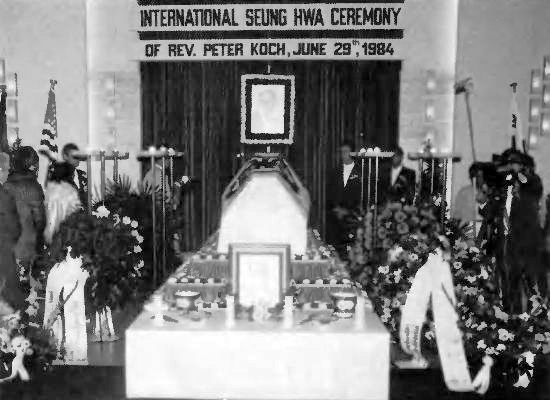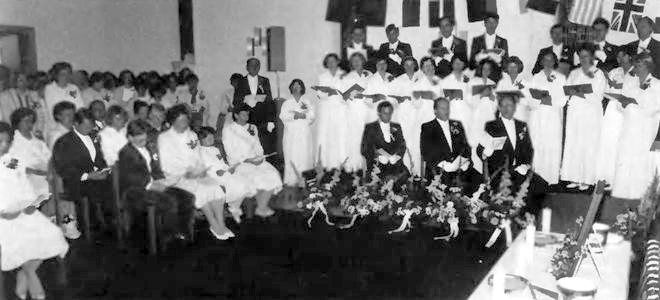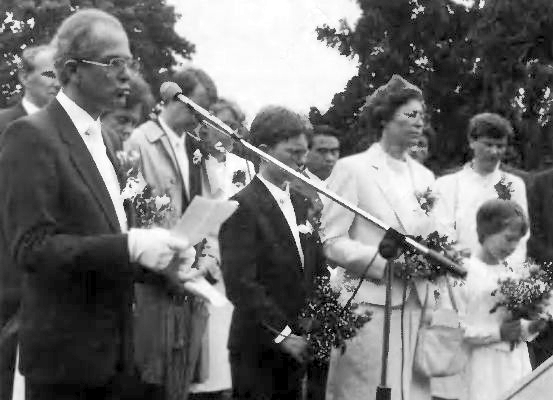![]()
The Words of the Koch Family
|
|
The Words of the Koch Family |

Rev.
Peter Koch, 1927-1984
On June 19, 1984, Rev. Peter Koch died unexpectedly at the age of 57. He was the leader of the Austrian Unification Church and the first Western missionary for the Unification Church to Europe. Peter Koch had strong chest pains over the June 17 weekend and went on the following Monday for a full medical examination. His condition was found to be critical and he was immediately brought to the nearest intensive care unit, Vienna's Floridsdorf Hospital. During the medical exam, the doctors found that he had had a heart attack on Saturday, June 16. Rev. Peter Koch had a second massive heart attack on 'Tuesday at 12 noon from which he could not recover. He died at 3:00 p.m. on Tuesday, June 19.
It was a quiet Friday morning in June, ten days after Rev. Peter Koch's passing. A warm summer rain was pouring down from the cloudy sky. The hall of the Hietzing Cemetery near the Vienna church headquarters was beautifully decorated with carpets, flags of Korea, the United States, Germany, Austria and other European nations. Thousands of flowers had been sent from all over the world. On the front wall, framed with yellow roses and white carnations, was a picture of Rev. Koch, smiling as we knew him when he was really happy. Prayer vigils had been held on the previous nights, so earth and heaven were prepared for a most dignified and solemn celebration.
At 8:45 a.m. Rev. Koch's oak coffin, with a hand-carved Unification Church symbol on its top, made by family members, was brought in. A few moments later Rev. Koch's family arrived from the church headquarters: his wife Gertrud, his children Goon Amen and Spring Anne, Rev. Reiner Vincenz and his wife Barbara (Rev. Koch's sister), and Rev. Koch's second sister Christel.
The coffin was opened for a last farewell from the family. After a short prayer the coffin lid was closed again and a procession line of brothers and sisters passed by reverently. Many of them had loved Rev. Koch like a father, secretly calling him "Daddy" like his own children did.

International
Seunghwa Ceremony of Rev. Peter Koch, June 29, 1984 in Vienna.
At 9:45 a.m. the ceremony started. In the hall, brightly flooded with lights, and in the outside rain, hundreds of members had come together as well as many parents and friends. After the "Holy Song of the New Pentecost" and "The Song of the Garden," were sung and the invocation given, Gertrud Koch and the children stood up before the altar and offered incense and red roses. Then Rev. Reiner Vincenz, the first member found in Europe by Rev. Koch, read a short biography of his spiritual father, followed by the reading of some inspirational words of Father. Then the Seunghwa sa (the Chairman's Memorial Address) was given by Mr. Masatoshi Abe representing Rev. Young Whi Kim (who could not come).
In his address Mr. Abe called this Seunghwa Ceremony a celebration of Rev. Koch's passing away to heaven:
In our understanding, the death of someone we love and respect does not mean eternal separation and, therefore, sorrow and despair. Rather we talk about a new birth, and that a great freedom is coming in this way to anyone who lived his life for God.
We all should remember the words which Reverend Moon, the Founder of our church, spoke when his own son passed away to heaven in January of this year. He said: "This is a new birthday for Heung Jin Nim. Let us celebrate his new birthday. He is now marching to a new world of glory and eternity by being reborn. He is now truly free to move in both the physical and the spiritual worlds, living permanently together with us." From these words we can understand that the occasion on which we gather today is not a sad one. Even though we cannot see Peter Koch living with us with our own eyes, we should be conscious beyond any doubt, that he is among us and that he is embraced by the love of God, our Heavenly Father.
We should learn from his life and dedicate ourselves today, as he did, to the service of God and humankind. When we look at the life of this great man, we testify to the life of a hero and a relentless pioneer. His deep search for truth brought him to join our church in 1962. He felt stricken in his heart when he understood how desperately God had been reaching out to His beloved children throughout history, and how little the people had responded. "When I became aware of this, the only thing I could do was to give God my whole heart," he once said in a sermon. "God was glad that I turned my heart to him, and somehow I could participate in this joy of God."
Soon after he joined, in America, he became the first Western missionary to Europe. In 1963 he started his mission in Germany as a pioneer for God. Always the ones who are going the first steps have to carry an incredible burden. Like the lonely seeker in the desert, he began to search for God's lost children, open to any call from God and willing to pay any time. His sacrifice and guidance to the early members established the foundation upon which our European church is now built. To create unity and to give a pure offering to God, he even fasted for forty days.
Peter Koch was always willing to stand up and fight for God. He was a hero who was willing to deny himself for a higher purpose. When he was impatient, he first of all was impatient with himself, that he could not do as much as he would have liked to do. From the official founding of the church in Germany in 1964 until 1969, he acted as her first president.
In 1969 he was blessed in marriage with his wife, Gertrud, in the first European Blessing, which was part of the Blessing of 43 International Couples. At the same time, Reverend Moon assigned him to be leader of the Austrian church. He strove with all his heart and energy to love Austria and her people. And he really loved Austria. His pioneer spirit and willingness to work under the most adverse conditions made it even more thrilling and challenging to him when our Austrian church was denied the most basic rights for legal existence. This spirit also made his advice and care so precious to many missionaries working in societies of much lesser freedom.
In recent years Peter Koch could share his treasure of experiences with many international members when Reverend Moon called him to work more closely with him in the United States.
Peter Koch leaves his wife, Gertrud, and his children, Goon Amen and Spring Anne, behind. They have every reason to be proud of him. He will be with them also in the future, loving and caring for them as before.
We all will always remember Peter Koch as the one who pioneered our path in Europe, as one of the great European leaders who built our church here. Let us be encouraged through the example of his life. Let us be heroes and pioneers for God and the people.

The
Unification Church choir singing a Holy Song.
In a second Memorial Address Mr. Rudolf Dangl, one of the earliest Austrian members, shared a few sentences of a testimony Rev. Koch gave five years ago to an international audience of Unification Church members in London:
You have to really pour out your heart to the members. Father has poured out his heart to us. God has poured out His heart...If you really let the sun shine on them, they will take off their coats, don't worry. But if you blow at them with wind, then they really tighten up their coats, they'll never take them off.
That is one of the reasons why I said: "No push." I am going to go and pull, because I figure, if you want to catch flies, you will do a much better job with sugar water than with vinegar. So try to inspire the people and show them the goal, and somehow increase their love for God and thereby increase their self-motivation.
The church choir then sang two Ukrainian songs which deeply express the hearts of so many peoples under totalitarian rule. Rev. Koch with all of his heart felt responsible for people in such situations and never failed to count them as a part of Europe.
Then Mr. and Mrs. Abe, Rev. and Mrs. Vincenz, the relatives, and representatives of nations and of the Austrian family offered incense and flowers. Everybody then sang the Holy Song "Song of the Victors."
With a prayer offered by Mrs. Hermengild Kollaritsch, Rev. Koch's assistant for many years and acting national leader, the ceremony was closed.

Won
Jeon Ceremony (Burial) of Rev. Peter Koch, June 29, 1984. Heinz Krcek
speaking. Next to him, Mrs. Gertrud Koch and children Goon Amen and
Spring Anne.
A long procession formed to follow the coffin to the grave. There the Won Jeon Ceremony was held starting with the "New Song of Inspiration." After a prayer one brother, Heinz Creek, presented a very personal sermon expressing Rev. Koch's high vision, his deep love for God and his clear-sighted understanding of what he called "the main thing" -- the living relationship of man with the living God. He closed his Memorial Address by aptly describing Rev. Koch's personality:
If Peter could be compared to a fruit then the coconut would be a fine example. Its outer shell is hard and rough, but on the inside one can find something light and refreshing. The people who knew Peter's inner self loved and appreciated him. Those that did not love him, never knew him. I can best remember Peter when he told us of God's love for us. He would say, "We only love what we know and know what we love."
While the coffin was lowered the choir sang Rev. Koch's favorite song, "When I Behold the Lord." Then his family, the chairman and all the representatives of nations and departments tossed flowers onto the coffin and placed one shovel full of soil into the grave. During this ceremony the rain gradually stopped, and when the three cheers of Mansei ended the Won Jeon Ceremony, the sun came out for a moment.
On the third day, Sunday morning, July 1, a smaller group followed Gertrud Koch and the children to the grave for the Sam Oje, the last ceremony of ascension. Again incense and flowers were offered together with some of the food Rev. Koch had liked most. While this was done an absolutely fine and friendly atmosphere arose, and we all could feel Rev. Koch's presence, showing us that there is no separation between "his" world and "ours" as long as we live in the realm of heart and love.